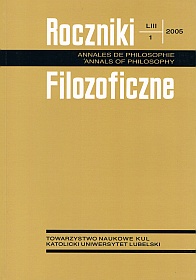Prawa logiki i prawa przyrody w ujęciu Johna Bigelowa i Roberta Pargettera
Abstrakt
J. Bigelow and R. Pargetter in their work Science and Necessity put forward a theory of the laws of nature as statements objectively different with respect to their modal qualification both from the laws of logic and from contingent truths. Contrary to the latter ones all laws are characterized by necessity. However, there are various kinds of necessity. The laws of logic are characterized by logical necessity, and the laws of nature – by natural necessity. The objective basis for differentiating modal qualification of statements belonging to the particular classes is that laws are truths about possibilities, also the ones that have not been actualized. The source of difference between logical and natural necessity is the differentiation between the range of possibilities described by respective laws. Hence, laws of nature prove to be – which is not mentioned by the authors – a posteriori necessary statements. The modal character has been the basis of the explanation of other considered properties of scientific laws: certain generality and the so-called range void.
Bibliografia
Bigelow J., Pargetter R.: Science and Necessity, Cambridge: Cambridge University Press 1990.
Braithwaite R.B.: Scientific Explanation. A Study of the Function of Theory, Probability and Law in Science, Cambridge: Cambridge Univerity Press 1953.
Cartwright N.D.: How the Laws of Physics Lie, Oxford 1983.
Hajduk Z.: Prawo przyrody, [w:] Leksykon filozofii klasycznej, red. J. Herbut, Lublin: TN KUL 1997, s. 446.
Heller M.: Filozofia nauki, Kraków: OBI, WN PAT 1992.
Herbut J.: Prawo, [w:] Leksykon filozofii klasycznej, red. J. Herbut, Lublin: TN KUL 1997, s. 440.
Hospers J.: Wprowadzenie do analizy filozoficznej, przeł. B. Chwedeńczuk, Warszawa: Aletheia 2001.
Hume D.: Traktat o naturze ludzkiej, t. 1, przeł. Cz. Znamierowski, Warszawa: PWN 1963.
Kripke S.: Nazywanie a konieczność, przeł. B. Chwedeńczuk, Warszawa: Fundacja Aletheia 2001.
Leśniak K.: Arystoteles, wyd. 3, Warszawa: Wiedza Powszechna 1989.
Losee J.: Wprowadzenie do filozofii nauki, przeł. T. Bigaj, Warszawa: Prószyński i S-ka 2001.
Nagel E.: Struktura nauki, przeł. H. Eilstein, J. Giedymin, B. Rassalski, Warszawa: PWN 1970.
Quine W.V.O.: Od bodźca do nauki, przeł. B. Stanosz, Warszawa: Fundacja Aletheia 1998.
Reale G.: Historia filozofii starożytnej, przeł. E.I. Zieliński, t. 1, Lublin: RW KUL 1994.
Reale G.: Historia filozofii starożytnej, przeł. E.I. Zieliński, t. 5, współpr. R. Radice, Lublin: Wyd. KUL 2002.
Russell B.: ABC teorii względności, przeł. Z. Markiewicz, Warszawa: Fundacja Aletheia 2000.
Wittgenstein L.: Tractatus logico-philosophicus, przeł. B. Wolniewicz, BKF, Warszawa: WN PWN 2000.
Copyright (c) 2005 Roczniki Filozoficzne

Utwór dostępny jest na licencji Creative Commons Uznanie autorstwa – Użycie niekomercyjne – Bez utworów zależnych 4.0 Międzynarodowe.





